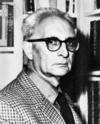- Lévi-Strauss, Claude
-
born Nov. 28, 1908, Brussels, Belg.Lévi-Strauss originally studied philosophy at the University of Paris (1927–32) but went on to teach sociology at the University of São Paulo (1934–37) and to conduct field research on the Indians of Brazil. At the New School for Social Research in New York City (1941–45) he came under the influence of the linguist Roman Jakobson; he came to view culture as a system of communication, analogous to a language, and constructed models based on structural linguistics, information theory, and cybernetics to interpret them. He attempted to identify universal structures of the mind as reflected in myths, cultural symbols, and social organization. From 1950 to 1974 he was director of studies at the École Pratique des Hautes Études, and in 1959 he joined the faculty of the Collège de France. Among his major works are The Elementary Structures of Kinship (1949), Tristes tropiques (1955), Structural Anthropology (1961, vol. 2, 1973), and the four-volume Mythologiques (1964–71).
 Claude Lévi-Strauss.AP/Wide World Photos
Claude Lévi-Strauss.AP/Wide World Photos* * *
▪ French anthropologistborn Nov. 28, 1908, Brussels, Belg.French social anthropologist and leading exponent of structuralism, a name applied to the analysis of cultural systems (e.g., kinship and mythical systems) in terms of the structural relations among their elements. Structuralism has influenced not only 20th-century social science but also the study of philosophy, comparative religion, literature, and film.After studying philosophy and law at the University of Paris (1927–32), Lévi-Strauss taught in a secondary school and was associated with Jean-Paul Sartre's intellectual circle. He served as professor of sociology at the University of São Paulo, Brazil (1934–37), and did field research on the Indians of Brazil. He was visiting professor at the New School for Social Research in New York City (1941–45), where he was influenced by the work of linguist Roman Jakobson. From 1950 to 1974 he was director of studies at the École Pratique des Hautes Études at the University of Paris, and in 1959 he was appointed to the chair of social anthropology at the Collège de France.In 1949 Lévi-Strauss published his first major work, Les Structures élémentaires de la parenté (rev. ed., 1967; The Elementary Structures of Kinship). He attained popular recognition with Tristes tropiques (1955; A World on the Wane), a literary intellectual autobiography. Other publications include Anthropologie structurale (rev. ed., 1961; Structural Anthropology), La Pensée Sauvage (1962; The Savage Mind), and Le Totémisme aujourd'hui (1962; Totemism). His massive Mythologiques appeared in four volumes: Le Cru et le cuit (1964; The Raw and the Cooked), Du miel aux cendres (1966; From Honey to Ashes), L'Origine des manières de table (1968; The Origin of Table Manners), and L'Homme nu (1971; The Naked Man). In 1973 a second volume of Anthropologie structurale appeared. La Voie des masques, 2 vol. (1975; The Way of the Masks), analyzed the art, religion, and mythology of native American Northwest Coast Indians. In 1983 he published a collection of essays, Le Regard éloigné (The View from Afar).Lévi-Strauss's structuralism was an effort to reduce the enormous amount of information about cultural systems to what he believed were the essentials, the formal relationships among their elements. He viewed cultures as systems of communication, and he constructed models based on structural linguistics, information theory, and cybernetics to interpret them.* * *
Universalium. 2010.
